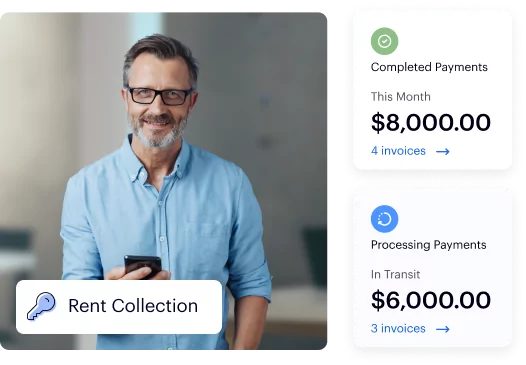In a perfect world, all landlord-tenant agreements would end in a civil, straightforward manner, with all outstanding debts duly paid. However, as we are all aware, the world that we occupy is far from perfect, and there are many situations where landlords find themselves with a tenant who has fled their unit early without paying rent.
In this Baselane guide, we’ll provide some options for how to collect unpaid rent from tenants after the tenant moves out or breaks a lease agreement unexpectedly.
Of course, every situation is different. If you’re trying to collect rent from a former tenant, it’s always best to consult with experts to get advice that matches your specific scenario. However, we hope this article will paint a good picture of the different options that are available to you.
Automated rent collection without the stress.
Try to Collect the Rent
While this option may seem a bit too obvious, it’s a worthwhile place to start. One of the best ways to ensure on-time rent payments is to establish both a rent collection policy and a pattern of clear communication with your tenant from the onset.
A good landlord automatic rent collection process includes details about how much rent is, when rent is due, how to receive rent payments (online, in person, mailed checks, etc.), and what late fees will be added if rent isn’t paid on time.
As soon as a part of this rent agreement has been broken, like late payment of rent, for example, you should inquire about the status of your rent payment with your tenant.
In some situations, you may be able to uncover a late payment or work out a payment plan. However, if your tenant fails to provide you with a solution and starts to field your calls, or if they have already begun the move-out process without alerting you, you may need to move on to stronger courses of action.
If you’re struggling to keep track of tenants that still owe you outstanding rent, you’re not alone. It’s genuinely hard to decipher who has paid rent and when at times.
The good news is that property management is finally entering the 21st century with tools like Baselane’s automated rent collection platform. This tool not only gives your tenants the flexibility to pay however they’d like but it also lends creates bird’s eye view of all of your on-time and past due rent payments. You can also set up automatic late fees to help encourage on-time payments.
Take the Rent Out of Your Security Deposit
In certain situations, you may be able to use your tenant’s security deposit for outstanding rent payments.
In fact, the very point of the security deposit is to provide the equivalent of one or two months’ rent. However, be careful, as this isn’t always the case, so make sure to check with your local state laws.
Depending on the state you operate in, you may be able to use a deposit to recoup rent money owed from a past tenant, with two months generally being the maximum.
Some states may also dictate when the deposit can be returned and may require landlords or property owners to pay their tenants interest earned on the deposit.
Even if your area allows landlords to use security deposits for past due rent after a tenant moves, it may not be sufficient. For example, if you raised the rent at any time during the lease agreement, then the deposit may no longer cover the amount of rent owed. You may need to look at more serious options if this is the case.
Keeping security deposits in a landlord bank account can have substantial benefits, such as low fees and cashback. Consider utilizing these landlord tools to improve your financial situation while straightening other issues with collecting unpaid rent.
Small Claims Court
If you are unable to recover unpaid rent through security deposits, your next stop may be small claims court. This usually happens when a tenant breaks a lease by leaving abruptly or leaves a casual rental agreement without giving proper notice.
In many cases, if the tenant has moved away, they will not show up in court, and the landlord will win by default. All you have to do in this situation is show up with the lease agreement in hand.
If your tenant leaves a unit early and breaks their lease, in many situations, you are responsible for mitigating your losses to the best of your ability.
This would include leaving at any time during a one-year lease or without providing proper notice on a month-by-month lease (where proper notice is usually 30 days but can vary).
This also means that you’re expected to try and re-rent the units. However, you may be able to include the costs of finding a new tenant in the claim for collecting back rent.
If a judge finds that a tenant fled an uninhabitable unit, you are not likely to win the case. This is because landlords forfeit their right to rent if they are unable to provide a rental unit that is fit for human habitation.
Collections Services
Some landlords may find the process of filing a lawsuit for unpaid rent in small claims court not worth the time or effort. Or, it might be too difficult to locate the new address of a previous tenant.
In both situations, it may make sense to use a collection service. These agencies work by charging an up-front payment in return for rent collection.
Alternatively, you can also hire a rent collection agency or a debt collections agency. Give the collection agency the lease agreement, documentation of your communication and attempts to collect rent, and the number of months the tenants are past due.
The collection agency may also request copies of the tenant’s drivers license and social security number, if you have them.
Expect to pay the collection agency a percentage of the amount recovered. For example, if the collection agency charges 25%, they will keep $250 for every $1,000 collected.
Debt Reporting
Another option is to report your former tenant’s rent debt to a credit bureau. You can ask the collection agency to help report past due rent payments or do this yourself.
While this option will not directly help you uncover rent immediately, it can motivate them to re-pay the rent in the long run.
Here’s how it works: you or the collection agency can report your former tenant’s debt to one of the three major credit bureaus.
To have these negative reports removed from their report, your tenant would have to satisfy the balance by paying the rent owed.
A negative credit score is a severe disadvantage, so this may be motivation enough for your former tenant to make amends.
Bottom Line: Collecting Unpaid Rent
The collection of unpaid rent is an unfortunate fact of life. Understanding the tenancy laws of your jurisdiction goes a long way in choosing how you can best react when these stressful situations arise.
You don’t need to handle the trials and tribulations of being a landlord alone. Using Baselane as your property management rent software can help you with the many responsibilities that come along with managing rental properties, including automated rent collection.
Put rent collection on auto-pilot
Get paid on time with automated rent payments, reminders, and late fees.
FAQs
The short answer to this is no. Unpaid rent is not tax deductible. Although unpaid rent is a debt owed to you by your tenant, it’s not deductible as a bad debt.
The reason behind this is that the IRS requires you to only deduct lost income if the income was forecasted (i.e., reported in advance). Most landlords operate on a cash basis, meaning that they report rental income when payments are received. They don’t report unpaid rent on their tax returns, therefore it is not deductible.
Yes, a security deposit can be used for unpaid rent. However, this will depend on the situation and the state that you operate in, so make sure to carefully check all local laws.
Also, note that many states limit the deposit amount that you can ask for to one or two months. In many cases, this will not be sufficient to cover unpaid rent charges, especially if the unit also has damage.
Yes, a landlord can sue for unpaid rent. Filing a claim against a tenant for unpaid rent can be handled within small claims court. A court judgment will typically be in the landlord’s favor, provided there is proof of a lease agreement. If the landlord did not provide safe and inhabitable lodging, they might not be able to recoup unpaid rent.
It depends. A landlord can ask for unpaid rent from a tenant who was on a month-by-month lease and who has also moved out without giving notice.
In the case of a verbal lease, there is a chance that your lease might be legally binding as long as you can prove the existence of a rental agreement.
However, this might not always be the case, and it’s always best that you consult a lawyer to navigate the particulars of your situation.
Stress-free rent collection
- Easy setup for landlords and tenants
- Fast payments
- Automated reminders and late fees

Don't miss these

AppFolio vs. Buildium: Which is the Best Property Management Software?
The AppFolio vs. Buildium debate is relatively common among individuals who need property management solutions. Both of these are popular platforms used by...
9 May 2023
The Basics of Rent Loss Insurance: Why Landlords Need it?
How would you sustain your rental property business in unforeseen circumstances if the property is no longer habitable for tenants? While your standard pro...
10 September 2024
Collecting Rent Through Zelle vs Baselane: Which is Better?
If you’ve ever had to chase down rent payments, you know why 6 out of 10 landlords prefer to collect rent online. With the rise of payment apps and rent ...
31 March 2022



